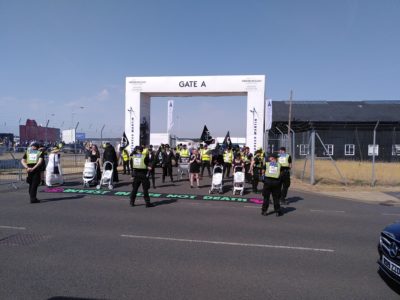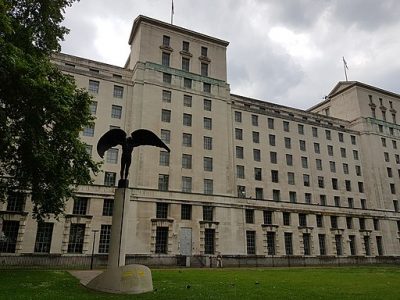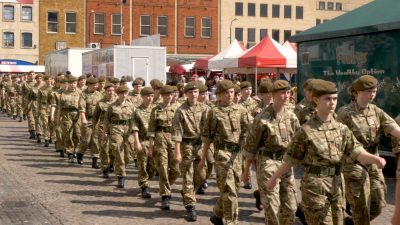We shall reach them in the classrooms: promoting a ‘military ethos’ in schools
ForcesWatch comment
Fostering a ‘military ethos’ in schools: what’s going on.
Earlier this month the Department for Education published a statement on their website outlining their ambition to promote a military ethos in schools across the country. They state that: “We associate the military with many positive values: loyalty, resilience, courage and teamwork, to name but a few. We recognise that these core values can have a positive impact on pupils”. Through developing projects such as Troops to Teachers and expanding schemes such as the cadets and other alternative military provision in schools (such as Challenger Troop), the government is now actively encouraging schools, especially newer Academies and Free Schools, which tend to exist in more disadvantaged areas, to foster a military ethos.
This official announcement is a major step in a growing trend towards the militarisation of England’s schools; coming after a series of announcements dating back to 2010 and including projects such as Troops to Teachers, military academies, a cadet option within the proposed National Citizen Service and most recently an £11million scheme to create 100 new cadet units in state schools by 2015. It marks the adoption of a ‘military ethos’ as a key part of this government’s education policy; yet this announcement, tucked away and hard to find on the website, has attracted almost no attention. Nobody is speaking out about this worrying trend despite its implications in transforming our schools without any public consultation about the nature of this transformation.
The lack of evidence behind the government’s ‘military skills and ethos’ work, which encompasses all of the listed schemes and announcements, is worrying. The entire multi-million pound endeavour seems to be based on little more than anecdotal evidence gathered from pro-military sources and a couple of more in depth pieces of work that advocate the militarisation of education – a report by Respublica calling for military academies and a 2010 impact assessment on the benefits of cadet units prepared for the Council for Reserve Forces’ and Cadets’ Associations. To base major government policy on two non-peer reviewed articles, both written by people wholly in favour of military engagement with education, demonstrates a clear lack of serious consideration when forming this policy which is ill-advised when one considers the potential negative impacts it may have.
Why is it happening?
What then, is the rationale behind such announcements? How, in a time of squeezed budgets, is the Department for Education finding the funds for such grand schemes? The answer lies in reports prepared by the Ministry of Defence, including the Defence Youth Engagement Review (2011) and the Recognition of our Armed Forces Report (2008). Promoting some of those values that were recognised by the Department for Education such as ‘loyalty, resilience, courage and teamwork’ as well as self-discipline and leadership do play a part in the reasons for engaging with schools. The MoD refers to the benefits received by other governmental departments throughout its Youth Engagement Review.
However, underpinning all of its youth engagement work are two key assertions: firstly, that by interacting with children they are able to influence and education future opinion formers and raise awareness about the positive role that the military plays in society. Secondly, that engaging with schools is a highly effective way of creating circumstances conducive to recruitment; which is a growing concern of the MoD’s in light of the recently announced trebling of its reserve forces to 36,000 by 2020. This assertion is argued against vehemently by those who volunteer with the cadets and other alternative military provision schemes, however, the MoD’s own research demonstrates that recruitment is a major consideration of theirs before they continue to commit £176million each year on the cadets.
Regardless of what politicians wish to believe, raising awareness and recruitment rather than promoting positive ‘core-values’ in young people, lie at the heart of why the MoD is willing to engage in this project; and should, therefore, play a part in discussions on whether the fostering of a military ethos in schools is a) necessary; and, b) positive. Discussions on the negative consequences to promoting the military in schools and recruiting from the classroom can be found elsewhere and are beyond the scope of this article.
However, briefly:
- Inviting soldiers in uniform into schools to raise awareness about the work of the military portrays the work of our Armed Forces as uncontroversial and a force for good. Whether or not you agree with the British military’s overseas operations, one cannot deny the controversy and anger that they spark in this country and across the world; why else would the government have commissioned the Recognition of our Armed Forces report? Allowing them a platform within schools to counter this, without inviting in opposing viewpoints (which very few schools do) promotes a very one-sided view of the military to potentially vulnerable and susceptible young people. The 2008 NUT resolution advocating for the exclusion of the military from the school environment suggests that this activity could be in direct contravention of the 1996 Education Act banning political bias from the classroom.
- The recruitment of under-18s to our Armed Forces is a practice which the UK shares with very few other highly militarised countries such as Iran and North Korea; and one that the United Nations condemns. That we recruit students directly from within a school environment is shameful and should be considered a breach of the school’s requirement to act in loco parentis whilst students remain in their care. The recruitment material of the Armed Forces has come under substantial criticism by groups and individuals across the country as well as young recruits in the Army for failing to depict what life is really like in the military. Although the MoD consistently denies in public that it visits schools for recruitment purposes the reports and reviews mentioned in this article, as well as the fact that those soldiers who visit schools are called ‘recruitment teams’ demonstrate explicitly that not only do they recruit from schools, but that this is their primary rationale for any youth engagement at all.
What’s wrong with a ‘military ethos’ anyway?
Further to any arguments about whether or not raising awareness about the military within a school environment, or recruiting from the classroom are appropriate activities within educational institutions, we must also question the assumption that a ‘military ethos’ is necessarily a positive thing. That the cadets provide a positive experience for the majority of those young people who participate in them is undeniable. That they promote certain positive values such as self-discipline, teamwork and loyalty is obvious from the many testimonies that exist from ex-cadet members. However, so do any number of other youth services, which instead of being bankrupted by government cuts should be receiving the same high level of funding that the cadets do if the government truly wanted to foster those values in young people. We would argue that any provision for young people that offered the ‘life-changing opportunities’ (Dept for Education) that the cadets do would be just as successful in turning around the misfortunes of the young people it works with – but the Dept for Education is choosing to focus exclusively on the military provision of these activities.
Post-riots, they find this choice easy to justify – we ‘need’ more discipline in our schools, and the military, as a bastion of disciplinary expertise is the appropriate provider of this service. Teachers that I have spoken to about this assertion have expressed outrage that they are not to be trusted with the discipline of their students. This assertion is also concerning when one considers the number of disciplinary issues in the Armed Forces – such as the hundreds of accusations of bullying last year, the numerous cases of sexual assault and the experience that many barracks towns have with drunken soldiers causing havoc on a Saturday night. We should recognise that a ‘military ethos’ goes beyond the positive values listed on the Department for Education’s website and that as an institution the military is beset by many problems relating to its values. As an organisation based on the premise that violence is necessary, and that consistently makes the news for its institutional sexism, homophobia and racism – the government is being deliberately selective when it chooses to ignore many of the negative factors that make up the ‘military ethos’.
I do not doubt that many soldiers and ex-armed forces personnel would make valuable contributions to our education system; that their life experience and desire to serve others would make many of them incredible teachers. However, to introduce a military framework into the education sector, which operates within an entirely different framework, is to ignore the purpose of education which is to foster intellectual curiosity and equip students with the ability to make rational, independent decisions based on evidence available to them. It also ignores the many problems which exist within the military, making the assumption that only the positive sides to the Armed Forces (which can all be disputed and challenged) will appear in the classroom.
See more: military in schools/colleges, military ethos, reserves
Like what you read?
> Sign up for our newsletter or blog notifications
> Support our work – from just £2 a month










